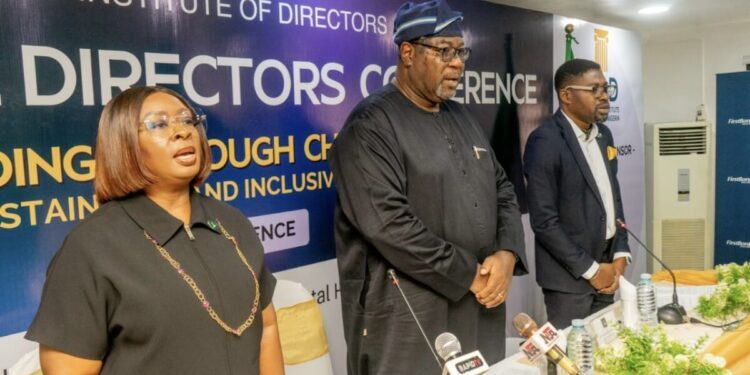Some economic stakeholders have called for strengthened governance frameworks and deeper collaboration between the government and the private sector for national growth and development.
They made the call on Thursday night during the ‘Government Meets Business Dinner’ at the 2025 Annual Directors Conference by the Chartered Institute of Directors Nigeria.
Uche Uwaleke, member of the Presidential Fiscal and Tax Reforms Committee, noted that the current era was marked by rapid technological disruption, geopolitical shifts, evolving fiscal realities, and the need to transition to a low-carbon, inclusive economy.
He, however, noted that for Nigerian enterprises, these changes represented both formidable challenges and unprecedented opportunities.
Mr Uwaleke said that leadership must be about confronting hard choices and making deliberate shifts for long-term stability, rather than maintaining comfort zones.
According to him, the federal government’s efforts, such as unifying the exchange rate, removing the fuel subsidy, and implementing tax reforms, reflect a leadership that understands that progress often begins with the courage to change direction.
Mr Uwaleke outlined three pillars of synergistic leadership: policy predictability, governance, and inclusion as a growth strategy.
He said governments that provided clarity, coordination, and credibility created the conditions for businesses to thrive sustainably.
Mr Uwaleke urged directors, as custodians of corporate strategy and governance, to use their influential positions to be ambassadors of the current administration’s reforms, including championing tax compliance within their organisations.
He said they must embrace tax and other reforms as a top priority on the board agenda, not a back-office function.
The chairman of Keystone Bank, Ada Chukwudozie, described effective governance as a discipline that served as the unseen infrastructure holding together resilient enterprises, stable economies, and credible institutions.
Ms Chukwudozie stressed that sustainability and collaboration must remain shared responsibilities among both sectors to ensure long-term growth. She noted that transparency, accountability, and inclusion were essential values for leadership in today’s dynamic environment.
Ms Chukwudozie said these principles informed Keystone’s collaboration with the Central Bank of Nigeria to promote financial inclusion for women and for micro, small, and cottage enterprises, which form the backbone of the nation’s economy.
Ms Chukwudozie also urged leaders to uphold governance as the bridge between policy and prosperity, noting that trust and integrity were central to sustainable progress.
The CIoD president, Adetunji Oyebanji, reaffirmed the institute’s commitment to strengthening collaboration between government and the private sector to promote sustainable and inclusive economic growth.
Mr Oyebanji noted the importance of fostering constructive dialogue, building trust, and strengthening partnerships between business and government —two vital pillars for the growth of sustainable enterprises in Nigeria.
Mr Oyebanji said CIoD Nigeria would continue to promote ethical, transparent, and accountable leadership through corporate governance advocacy and policy engagement.
He commended President Bola Tinubu’s administration for its support and collaboration and urged continued alignment between government and enterprise to build a resilient and inclusive economy.
(NAN)






